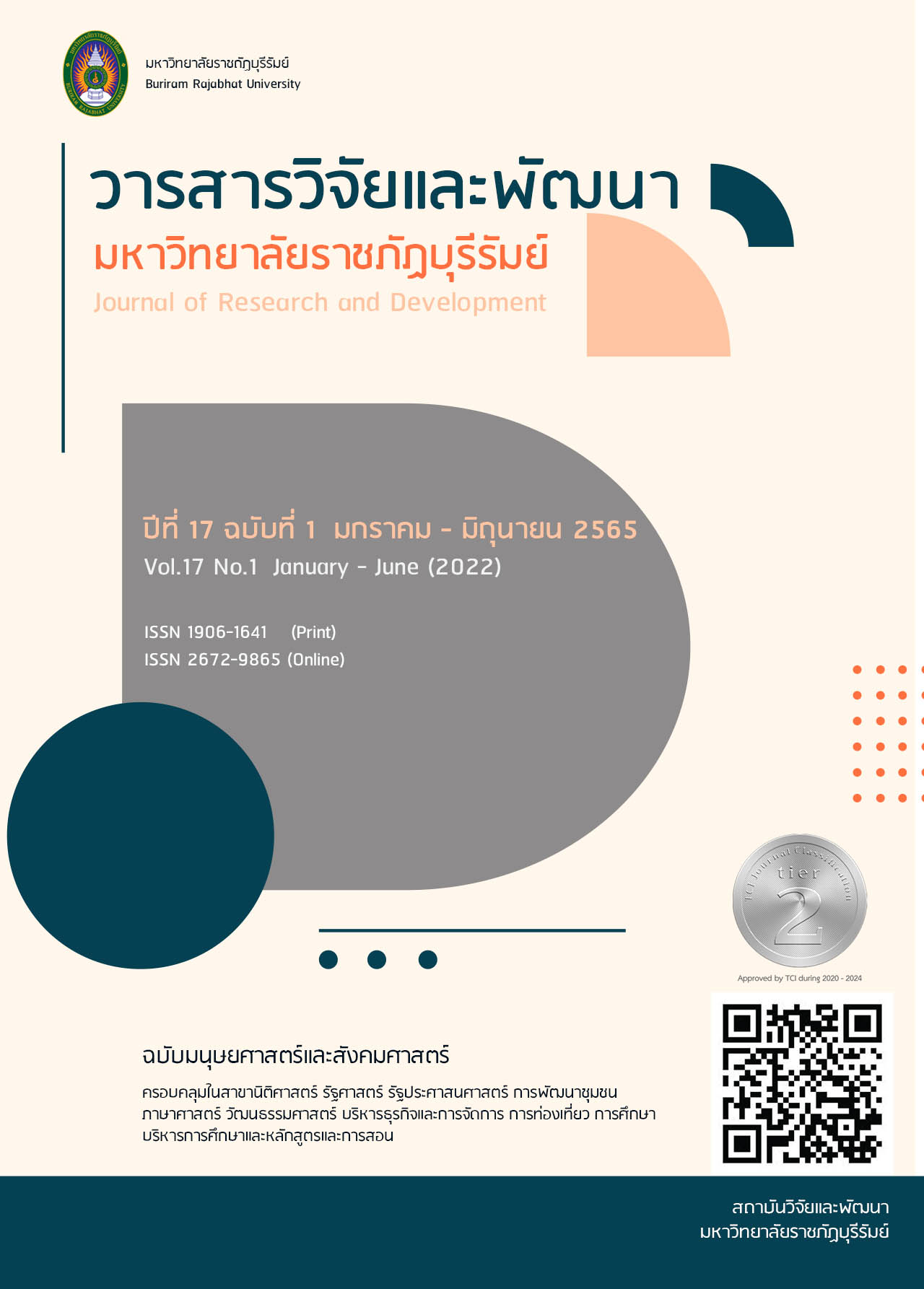การพัฒนานวัตกรรมการจัดการความรู้หมู่บ้านเศรษฐกิจพอเพียงต้นแบบ : กรณีศึกษาบ้านสายออ หมู่ 1 ตำบลสายออ อำเภอโนนไทย จังหวัดนครราชสีมา
Main Article Content
Abstract
The objectives of this research are to study the process of knowledge management innovation of the sufficiency economy model village to investigate conditions/factors contributing to the success of the sufficiency economy model village and to develop the knowledge management innovation of the sufficiency economy model village. This is a qualitative research, and the tools included in-depth interviews, group discussions and observations.
The findings are as follows. 1) In terms of the process of knowledge management innovation of the sufficiency economy model village, the study area is in Village No. 1, Sai-or Village, Non Thai Sub-district Nakhon Ratchasima Province. The process of knowledge management was classified into 5 issues: knowledge determination, knowledge acquisition and maintenance, knowledge exchange, knowledge storage, and application. The research was in accordance with the sufficiency economy philosophy through 5 community activities: 1) sufficiency - vegetable growing activity at a household level, 2) logic - community stage at a village level, 3) good immunity - household accounting activity, 4) community knowledge - local wisdom learning activity, and 5) morality - activity to encourage people to reduce, refrain and quit vices. 2) The conditions/factors contributing to the success of the sufficiency economy model village were divided into (1) internal factors consisting of community culture, local wisdom, community leader, community economy system, natural resources and environment and (2) external factors consisting of support from the public sector. 3) In terms of development of knowledge management innovation, a guide to sufficiency economy model village knowledge management was developed with a simple language and pictures in a form of E-book, so it was accessible.
Article Details

This work is licensed under a Creative Commons Attribution-NonCommercial-NoDerivatives 4.0 International License.
เนื่อหาและข้อมูลในบทความ เป็นความรับผิดชอบของผุ้แต่ง
บทความในวารสารเป็นลิขสิทธิ์ของวารสารวิจัยและพัฒนา มหาวิทยาลัยราชภัฏบุรีรัมย์
References
กรมการพัฒนาชุมชน. (2554). คู่มือการพัฒนาหมู่บ้านเศรษฐกิจพอเพียงต้นแบบ. กรุงเทพฯ : สำนักเสริมสร้างความเข้มแข็งชุมชน กระทรวงมหาดไทย.
ณัฐนิชา สมฤทธิ์ .(2555). การจัดการความรู้ชุมชนต้นแบบเศรษฐกิจพอเพียงระดับประเทศ กรณีศึกษา ชุมชนบ้านดอกบัว หมู่ที่ 4 ตำบลบ้านตุ่น อำเภอเมืองพะเยา จังหวัดพะเยา. วิทยานิพนธ์ รัฐประศาสนศาสตรมหาบัณฑิต สาขาวิชารัฐประศาสนศาสตร์. พิษณุโลก : มหาวิทยาลัยนเรศวร.
ณัฏฐ์ฎาพร แสงสุวรรณ. (2555). ความสำเร็จในการขับเคลื่อนปรัชญาเศรษฐกิจพอเพียงของหมู่บ้าน เศรษฐกิจพอเพียงต้นแบบในจังหวัดเชียงใหม่. วิทยานิพนธ์ รัฐประศาสนศาสตรมหาบัณฑิต สาขาวิชารัฐประศาสนศาสตร์. เชียงใหม่ :มหาวิทยาลัยเชียงใหม่.
พระครูจันทธรรมานุวัตร (มะลิ โคตรแสง). (2560). นวัตกรรมการจัดการความรู้บนพื้นฐานวิถีพุทธประเพณี เพื่อชุมชนที่เข้มแข็งและยั่งยืน. วิทยานิพนธ์ปรัชญาดุษฎีบัณฑิต สาขาวิชานวัตกรรมเพื่อการพัฒนาท้องถิ่น. มหาสารคาม : มหาวิทยาลัยราชภัฏมหาสารคาม
สิปปภาส โรจนวสุธร และ บุญสม เกษะประดิษฐ์. (2561). “นวัตกรรมจากรากหญ้าแนวเศรษฐกิจพอเพียง กรณีศึกษา: กลุ่มเครือข่ายปราชญ์ชาวบ้านอีสาน.” วารสารการบริหารปกครอง (Governance Journal). 7(1) : 681-702.
Davenport, Thomas H. and Lawrence Prusak. (1998). Working Knowledge: How
Organization Manage What They Know. Cambridge, MA: Harvard Business School Press.


